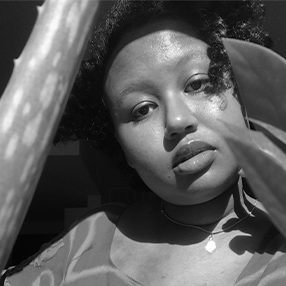Under the Tuscan Sun (2003): A Romance I̶n̶t̶e̶r̶r̶u̶p̶t̶e̶d̶
In lieu of a break down, I buy a Tuscan villa
with what’s left of the alimony.
The keys I am given are old and because
I am a novelist, I imagine my past lives
as the generations that once lived in this house
and each one of them is white.
Citizenship goes unsaid; the visa process unsexy, the man who will teach me
taxing, and therefore not worthy
of a plot line—unlike
that after a lengthy divorce I can still orgasm.
He takes me to Rome—O Roma! I already miss
the Tuscan fields, where the olive trees are plucked
by Black hands that were plucked from the Mediterranean, row after fragrant row
and from the road, don’t look like hands
at all, but like
of gnarled branches. Love becomes me in this new city.
I am always radiant. My body, after all, a vessel
of history, but I dress it in white, cinched
at the waist, and no one says a thing.
I antique shop, never suspecting I could find
my skull behind glass, just another artifact, price tagged
and measured, among such fine china. He leaves me of course.
After all, we’d never survive it; not love or the hours
long drive between us, but the credits rolling.
I don’t shed a single tear (I’m lying, enough to flood the piazza).
Besides, there are many men to take his place, ballads of them.
Men, who will touch me, their hands staying hands,
and not blossoming into a rifle, or a colony this is the pinnacle of romance
of ants—, I’m sure.
Men, who tell me I have eyes they could drown in.
Men, who have never been left to die at sea. I want to
lie naked in their beds—my desire, simple
and ahistoric—and rename each place they kiss me
like conquered territory: Giorgio, Marcello,
Pietro, whose oiled lips at dinner
could make a blush cross Mary’s porcelain cheeks.
Copyright © 2021 by Edil Hassan. Originally published in Poem-a-Day on October 15, 2021, by the Academy of American Poets.
“I wrote this poem after watching the film, and considering persona and how all rom-coms exist in the genre of fantasy. What must be excised in order for romance to succeed? How is belief a form of erasure? How is persona a possession, both an ownership and a spiritual capture? Is it possible to have a steamy love affair after a ‘brief’ mental breakdown? This poem has become a larger hybrid project in the form of a film treatment that uses the work of Saidaya Hartman and Robert Bresson to explore these questions.”
—Edil Hassan

